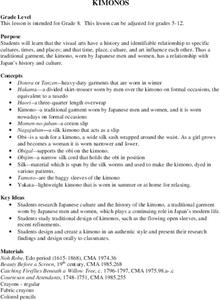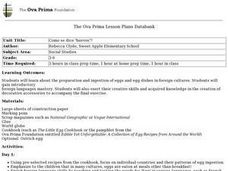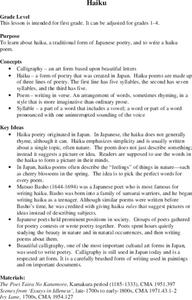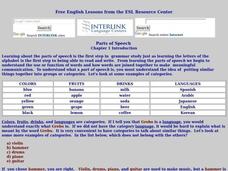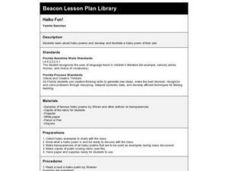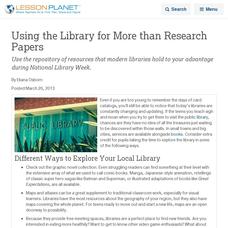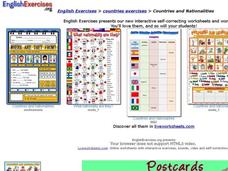Curated OER
"For the Birds" [part I]
Students identify birds that appear in Chinese and Japanese art, learning about
their physical characteristics, classifying them according to scientific principles, and exploring their habitats and migration patterns. This is part one...
Curated OER
Kimonos
Students create their own kimono design after researching the history, tradition, and techniques of kimono design and production. This art lesson can be connected easily to the Language Arts and/or Social Sciences.
Curated OER
Como se dice 'huevos'?
Young scholars research about the preparation and ingestion of eggs and egg dishes in foreign cultures. Students gain introductory
foreign languages mastery. Young scholars also exert their creative skills and acquired knowledge in the...
Curated OER
Bodhidharma/Daruma Doll Lesson
Pupils investigate the historical Bodhidharma and focus upon the founding of Buddhism in China. They create two-dimensional Daruma dolls and define the term of enlightenment using simple language. Students read about the legend while...
Curated OER
The Role of the Teacher
Students study the role of the teacher in various cultures and societies through in-class discussions, literature investigations, and personal reflection. Lesson extensions include a "Living Portraits" activity and a "Student becomes the...
Curated OER
Haiku
Students work collaboratively to create a class Haiku and illustrate the poem individually in this elementary school lesson. The lesson includes five possible enrichment activities.
Curated OER
A Thousand Paper Cranes
Students, after finishing Sadako and the Thousand Paper Cranes by Eleanor Coerr, discuss the tragedy of Hiroshima and its impact.
Curated OER
"Encounter with a Skull"
Students read a story twice. The first time they read it is without contextual information. They read it with the contextual information.
Curated OER
Parts of Speech
In this grammar worksheet, students focus on the various parts of speech. Students respond to 10 multiple choice questions in this online interactive worksheet.
Curated OER
Oral History Memoirs of American Experiences in Japan
Students identify the process of producing an oral history/documentary. Students analyze and synthesize information and memoirs as a valuable tool for exploring the past using primary resources. Students differentiate facts of historical...
Curated OER
Laws of Life
Young scholars express the values they value the most by writing an essay. They can submit their essay online and respond to other student's essays as well. They are to intiate change if they deem something to be unfair.
Curated OER
Getting Oriented
Students explore the geography, culture, and philosophy of Asia using all five senses and information about China and Japan. This lesson is detailed and may take several days of in-class activities to complete.
Curated OER
Do You Judge a Book by Its Cover?
Learners cut pictures out of magazines that relate to their lives, glue them on bags, and share with classmates.
Curated OER
Timely Tolerance
Eighth graders work together to focus on an oppressed group of society. Using the information they gather, they create a museum exhibit to educate their community on the group. They present their PowerPoint presentation to the class to...
Curated OER
The Bracelet
In this The Bracelet learning exercise, students read the book The Bracelet and answer short answer questions about it. Students complete 12 questions total.
Curated OER
The Quality of Equality
Students are introduced to the Canadian Charter of Rights and Freedoms. They relate it to their own rights, freedoms, and responsibilities as Canadian citizens. They create pictures illustrating equality.
Curated OER
Using the Library for More than Research Papers
Use the repository of resources that modern libraries hold to your advantage during National Library Week.
Curated OER
How Big is Big?
Geography learners compare and contrast population densities throughout the world. Using maps, they estimate the relative size of the world's regions and populations. They develop analogies to discover the world they live in and...
Curated OER
What to Wear: Career Day! Suit of Armor From Japan
Learners understand that some jobs require workers to wear special clothes or a special suit. In this art appreciation lesson, students observe the Suit of Armor and discuss how a samurai is requires to wear armor to work. Learners pick...
Curated OER
You Too Can Haiku
Students conduct Internet research and explain the history of Haiku. After listening and reading various examples of Haiku, students use their own vocabulary and practice their math skills to determine the correct number of syllables...
Curated OER
English Exercises: Countries and Nationalities
In this online interactive English instructional activity, students respond to 19 fill in the blank questions that require them to use English vocabulary appropriately. Students may submit their answers to be scored.
Curated OER
Navajo Code Talkers of WWII
Eighth graders assess different ways that significant individuals and events influenced economic, social and political systems in the United States after 1880. They experience a Navajo code talker's dictionary to create and decode messages.


!["For the Birds" [part I] Lesson Plan "For the Birds" [part I] Lesson Plan](http://content.lessonplanet.com/resources/thumbnails/122462/large/cgrmlwnvbnzlcnqymdeymtaxny0ynji5lwd4n2h5by5qcgc.jpg?1414222903)
